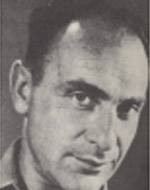Son of Yehoshua-Haim and Tzipora. He was born on the 4th of Tevet 5712 in Riga, Latvia, and his father, a Chasidist of Chabad and an enthusiastic member of the Mizrachi movement, was the principal of an elementary school Nehemiah studied; The father, who was a scholar and scholar, gave his hand to the foundation of the “Tushiyah” Gymnasium, ran it and taught it. Nehemiah graduated from this high school; At home he absorbed the connection to the Land of Israel and the Hebrew language. However, the influence of Hashomer Hatzair (the Russian movement, later known as “Hashomer Hatza’ir – Netzach”) was similar to that of the youth movement, As part of the Latvian Scout Movement and later as an independent movement movement called “Bar Kochba”, the emissaries of the Sumerian movement from Sosar, under the influence of the Zionist movement and the educational values of the pioneering movement, Nehemiah was very active in this movement and showed great loyalty to it and its operation. In 1935, Nehemiah left his home and immigrated to Israel, and no one saw his family for years after the Second World War, with the ownership of his brother David, the last surviving descendant of the Neimanotin family (Nehemiah changed his family name in Argov over the years). He immediately joined the ranks of the Haganah. He was one of the founders of Kibbutz Ein Gev and its active and prominent members. In 1940, when they left the kibbutz, he moved to Haifa, and after his various occupations he reached the main field of his life activities – the Hagana and continued in the IDF – first appointed Hagana’s information officer in Haifa and after a while, (Dostrovsky), who served as the head of the General Staff of the Haganah and afterwards of Yisrael Galili and Yitzhak Sadeh, and was appointed military adjutant of the Prime Minister and Minister of Defense at the time, David son of-Gurion became a military secretary in January 1950. At the beginning of 1952 he underwent a course for battalion commanders and brigade commanders, and at the end of 1954 he began a parachuting course with senior army commanders. In 1955, Nehemiah returned to his place and continued his work with him with infinite love and boundless devotion, he grew up with his position and reached the rank of colonel, who by nature was humble and modest, and with all his meticulousness in official matters he had a sensitive and warm Lev in his relations with people. At the time, one of his most noble qualities was expressed: he was a man of public awareness, and yet he was sometimes lonely, and only his closest friends knew about it: Nehemiah never revealed it publicly: – achievements and applauding cheers – age and the psyche of mind reserved for himself. On the 28th of March, 1957, he died – and the news of his death shocked the entire public and his many friends throughout the country and was brought to eternal rest in the military cemetery in Kiryat Shaul, with masses of friends and relatives walking gloomy and mourning after his bed. One of his great lovers was not among the escorts – the prime minister, who was then in the hospital in Jerusalem (after a bomb was thrown in the Knesset) .On two weeks or so, on November 18, 1957, when the prime minister appeared for the first time after the incident, In February 1958, a club for the younger generation of the Eretz Israel Workers’ Party, named after the late Nehemiah, opened in Holon. On the first anniversary of his death, his friends published a collection of his estate (Igrot and Pirkei Diary), in addition to appreciation and remembrance. A large central memorial factory was also established in Kfar Blum (including a study room,A sports court, a tennis court and an Olympic swimming pool) called Yad Nehemiah.
